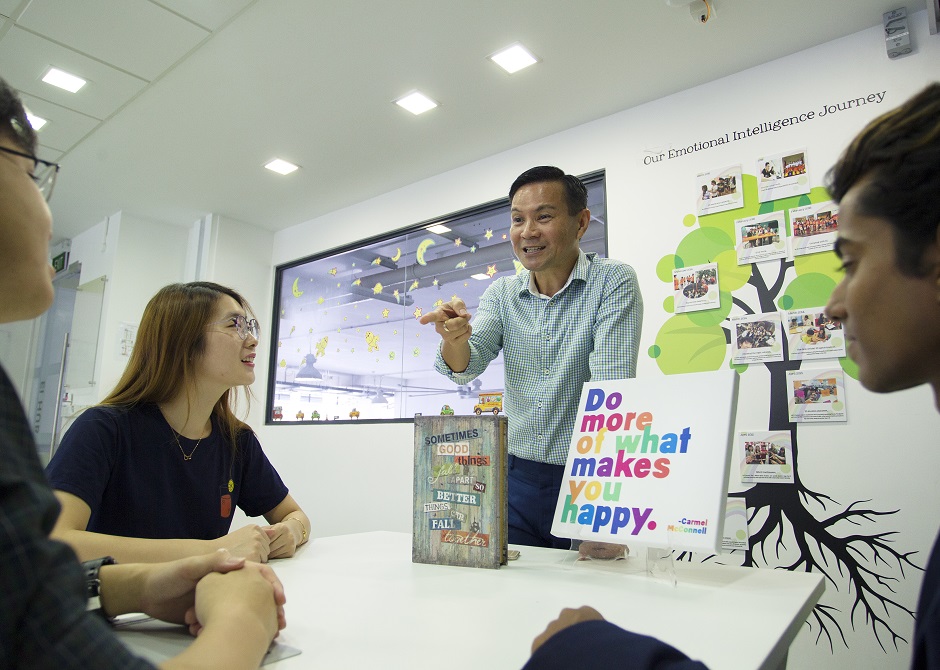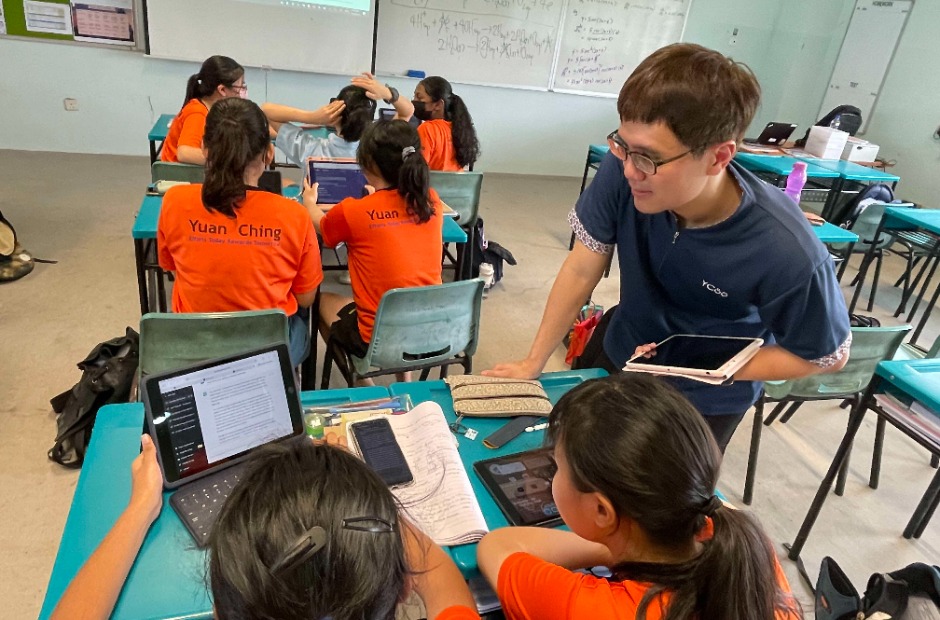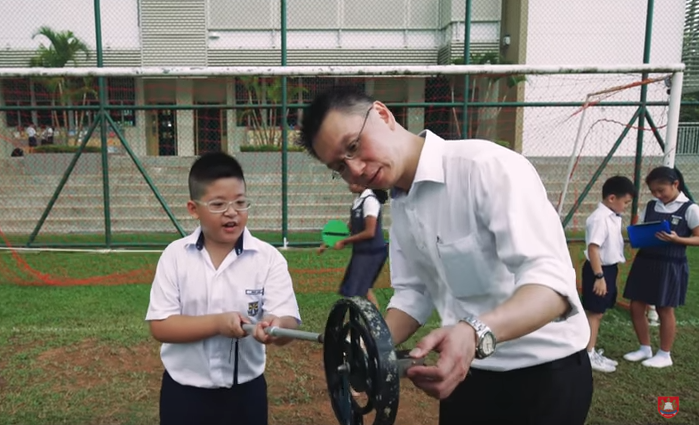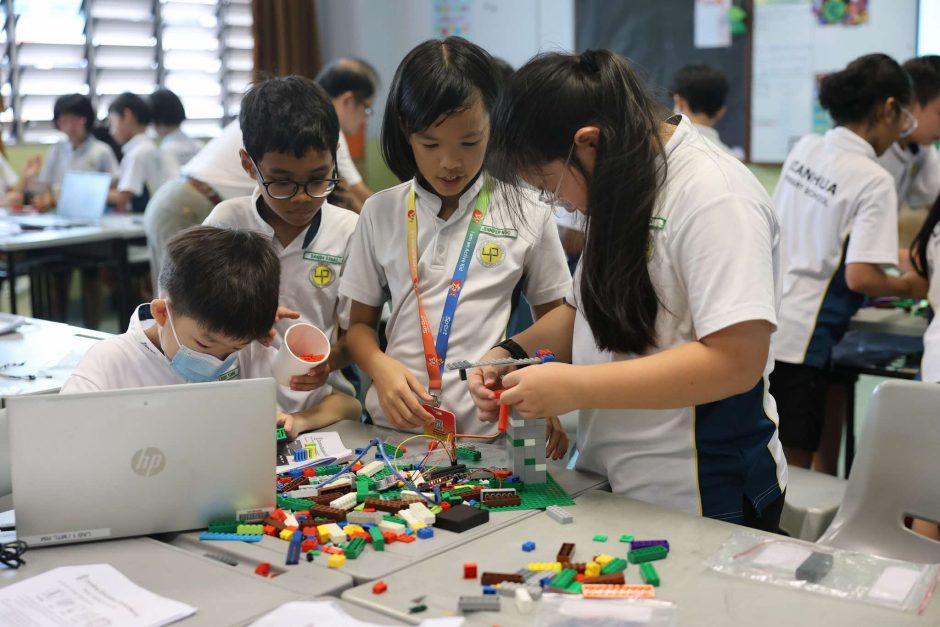Mr Teo Keng Ann, Singapore Polytechnic, President’s Award for Teachers 2018 Recipient
Pondering how to capture his students’ attention in their marketing course, George Teo suddenly had a great idea. He was a die-hard fan of the reality television show MasterChef. So why not conduct his class like a game show?
“The students never know what to expect,” said the Course Chair in Business Innovation and Design at Singapore Polytechnic. On a particular day, they may have to do a “marketing relay” where they take turns to run to a board and write down answers to questions.
On another, they may have a mystery test, with a task given to them in a sealed envelope. It could be devising a plan to sell lollipops in India. They are not allowed to use Powerpoint to present their ideas — they have to draw them out by hand.
“I want them to learn how to be creative. They must realise that a picture speaks louder than words. And when they start drawing, there is a lot of energy going on,” George says.
They may also be called upon to “Create Your Own Cake”, where they have to design and build a mock-up of a cake. George tells them that it is for a couple’s 50th wedding anniversary. The students then get to ask only three questions to help them determine the right details for the perfect cake.
“I want them to ask the right questions so that they can come up with the meaning of the cake. You don’t sell the product. You sell the meaning of the product,” George explains.
The main learning point he wants his students to take away from this is that “the presentation and the story are very important, because they show whether you really understand the customer’s needs and wants”.
It all begins with EQ
The origins of George’s unique approach can be traced back to a much more sombre period in his life. In 2011, his father passed away suddenly. Soon after, his mother was diagnosed with dementia. His life turned upside down, and he knew he had to do something about it.
Singapore Polytechnic was then looking for an EQ coach, and he volunteered. After the year-long training, George found that he became more self-aware and better able to navigate his emotions, particularly when it came to managing his mother’s condition. This improved their relationship.
These experiences served him well as teacher, too. “I was looking at some of my students and realised they looked like I did, seven years ago. They had no passion, no energy. I had a sense of déjà vu.”
George did EQ profiles of 200 students. He found that many of them had low confidence levels, and did not know what path they wanted to take in life.
He decided to work with them to develop a programme to help address these issues.
George is proud of the fact that the students themselves came up with the activities for the programme and even the name itself. “We held a co-creation session at the beginning on what to call the programme. I wanted something about being superheroes but my students told me, ‘’Cher, we want to be our own heroes!’”
And so, Be Your Own Hero, it was.
After each session, George would debrief the participants and link the learning points back to their EQ test results.
During one such debrief, a student told him that his “sky was black”. He wanted to be a football player, but a very bad injury meant that he could not pursue his dream career. George gradually guided him to the idea that he had to do something with the rest of his life.
The boy went on to graduate and today, he continues to send his former teacher messages such as “Today my sky is blue” or “My sky is red”. George is encouraged by this. “Now there is colour! Things like that motivate me to keep doing more.”
Design thinking in the hotel industry
Beyond the classroom, George is also bringing design thinking to the workplace. In an ongoing project with NTUC, sponsored by the Singapore Tourism Board, he works with people from the hotel industry to uncover skills gaps in the sector.
The traditional approach would be to form focus groups of hotel staff and ask them about their skill gaps. Instead of this, George created personas and encouraged a hundred hotel employees to visualise for themselves what their job scope would be like in 10 years’ time, and where they see the skills gaps are.
The key finding was the impact that digitalisation is expected to have on the industry.
Explaining the importance of the process, George said, “Instead of us telling them that digitalisation is important, through this exercise, they are the ones who say that digitalisation is very important. And they are the ones who come up with solutions, such as doing analytics to find ways to improve customer service.”
As he had proven in the classroom, empathy and design thinking are very powerful tools. “The buy-in is different. The participants themselves realise that digitalisation will disrupt their work, and that they will have to do things differently.”
“He brings out the best in us. He sees the EQ test results and knows, for example, that a student has no confidence and is not stepping up. During tutorials, he will bring the student out of his comfort zone and encourage him to answer questions, and challenge him to give presentations to the class. He takes notice of every single student and makes sure we are doing their tutorials. And we remember the things he teaches, because he is very passionate about his subject.” – Justin Lee, Diploma in Business Administration graduate from Singapore Polytechnic






